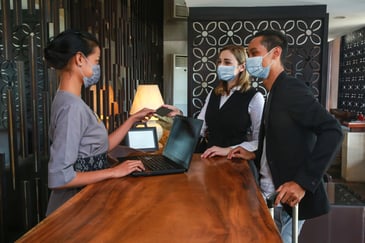5 Crucial Considerations for Your Hotel Property’s Assembly Point Plan
Is your hotel prepared to handle any emergency? On the off-chance that a fire breaks out or there’s a natural disaster, it’s important to get staff...
3 min read
 WrkSpot
:
Jan, 10, 2023
WrkSpot
:
Jan, 10, 2023
What should you be doing to ensure your hotel is a safe place for staff as well as guests? Hospitality safety is a question that concerns many hotel owners and managers—with good reason. In 2018, the American Hotel & Lodging Association (AHLA) gave the industry an answer.
Because of the nature of their duties, hospitality employees often work alone, isolated from their colleagues. This gives ill-intentioned guests—or other staff members—an opening to commit criminal acts, including harassment and sexual misconduct. These traumatic incidents take a psychological or physiological toll on everyone involved. They can also impact your business in more tangible ways.
Hotels and lodging establishments may also incur substantial financial penalties. This makes it all the more important to instill protocols to protect your team from unwanted advances. By establishing hospitality safety standards, AHLA’s 5-Star Promise is meant to do just that.
The initiative entails a voluntary commitment by AHLA members to improve safety and security for hotel workers and guests. In addition to enhancing policies, training, and resources, this system focuses on providing safety devices for the staff. Already, 60 member companies, representing an estimated 20,000 hotel properties and 1.2 million employees have pledged to adopt the 5-Star Promise.
Here, we’ll unpack some of the developments currently underway to establish safer, harassment-free work environments.
What is the AHLA 5-Star Promise?
All major hotel groups are becoming increasingly concerned about the issue of hospitality safety. When the 5-Star Promise was first introduced in September 2018, 17 companies backed the hospitality safety initiative.

By 2019, that number had risen to 56, with millions of employees benefiting from the rollout of staff protection technology, policies, and training. Additionally, the Promise has led to partnerships with national organizations that aim to end sexual violence and fight human trafficking.
The 5-Star Promise aims to strengthen the hospitality industry's employee safety culture. For instance, introducing prevention tactics and response strategies to protect guests and staff from the threat of sexual assault.
The Promise comprises five pillars that translate into tangible actions that hotel managers and owners can take. These include:
How COVID-19 affected the AHLA 5-Star Promise
 COVID-19’s toll on the hotel and lodging industry damaged not only occupancy rates but also the frequency of employee turnover. Some 70% of hotel staff were laid off or furloughed when the first wave of the pandemic hit. Some experts suggest that the impact of the virus on the travel industry was nine times greater than 9/11.
COVID-19’s toll on the hotel and lodging industry damaged not only occupancy rates but also the frequency of employee turnover. Some 70% of hotel staff were laid off or furloughed when the first wave of the pandemic hit. Some experts suggest that the impact of the virus on the travel industry was nine times greater than 9/11.
In response to the drop in travel, most hotels continued to operate with minimal staffing. As leisure locations grappled with the financial setbacks created by the pandemic—while also trying to retain employees—the 5-Star Promise and its mission to instill hospitality safety protocols became less of a priority for many hotel managers and owners.
Now, as the world emerges from the worst of COVID-19, the hotel industry is likewise experiencing a steady recovery, and the Promise is again gaining traction.
What this means for hospitality safety
As hotel occupancy rates rise, it’s important to grasp how to implement hospitality safety protocols that support the 5-Star Promise. Combining new technologies with extensive training courses and clearer policies can help prevent sexual harassment and retaliation against victims.
By leveraging this combination, employers are setting new expectations for their staff. Moreover, they are promoting safety through technology, which will eventually become an industry standard.
For hotel managers and owners, it’s not a matter of if but when to implement the 5-Star Promise. Further, hotels are promoting their hospitality safety protocols to attract new talent in a tight labor market. In fact, neglecting to instill such protocols or failing to provide workers with the necessary employee safety devices (ESD) could lead to litigation.
The rise of hotel safety technologies
 Regulators are taking greater notice of the issue of hospitality safety. Moreover, they have begun requiring certain technologies to protect your staff, physical hotel property, and brand reputation. This covers a range of issues, from workplace injury and sexual harassment to guests storing illegal materials.
Regulators are taking greater notice of the issue of hospitality safety. Moreover, they have begun requiring certain technologies to protect your staff, physical hotel property, and brand reputation. This covers a range of issues, from workplace injury and sexual harassment to guests storing illegal materials.
In tandem with the 5-Star Promise, the AHLA is working to equip all hotel employees with ESDs. Fortunately, managers and owners have many options to choose for use in their properties.
WrkSpot’s room beacons are one such example. These devices can be placed in rooms and public areas, allowing you to see where your employees are at any given time. Not only can this sort of intel make day-to-day processes more efficient (cleaning and turndown service, deliveries to guests, etc.), but you’ll also be able to locate your employees in the case of an emergency.
These beacons utilize the WrkSpot app to notify your team members’ phones in real time. Moreover, the data from WrkSpot’s beacon is stored, which can later be used to verify an employee's whereabouts at a specific time.
Hospitality safety for the competitive edge
The AHLA’s 5-Star Promise has spotlighted the important subject of hotel employee safety. Major hotel and lodging brands are continuously adopting new technologies, instituting more extensive training, and establishing policies that optimize security for guests and employees.
COVID-19 forced a slew of national and international businesses to close permanently, dramatically increasing industry competition. As travel activity starts to recover, accommodation establishments need to up their game to win guests and improve business. And gaining that competitive edge starts with your approach to hospitality safety.

Is your hotel prepared to handle any emergency? On the off-chance that a fire breaks out or there’s a natural disaster, it’s important to get staff...

As the world reopens, travelers are ready to hit the road and make up for a lost time - it's time for revenge travel! Hotels can prepare for the...

The hotel industry has a fine line to toe between investing too little in tech and having too many solutions entirely. Poorly selected and...